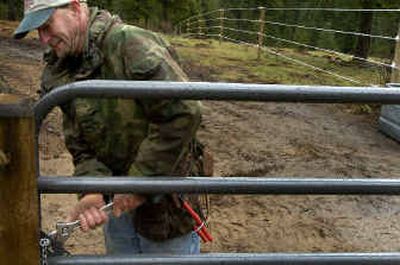Hard work and horse sense

Stringing fence in the rain is the sort of drudgery that makes farmhand a dying occupation.
But it doesn’t bother Ruedi Schuler, who emigrated to Spokane from New Zealand a couple years ago and has turned his skill building fences into a bustling business.
Working outside of Deer Park last week as rain showers soaked the area, Schuler said he’s thankful that hard work and knowledge “can still get a person ahead in America.”
He specializes in building fences for horse owners and has been so busy during the past year that the jobs are stacking up.
The fences he builds are not your typical enclosures. Schuler will erect a post-and-rail fence, but he prefers a type of electrical fence pulled taut that keeps horses in and wildlife out without risking the sort of injury that barbed wire can inflict.
During his first year in business, Schuler has put up about 25 miles of fence. He works alone, a perfectionist who is earning new customers by reputation and word-of-mouth advertising.
With an abundance of people buying and building on rural lots within an hour of Spokane, Schuler figures there’s enough business to keep him busy for years. A survey several years ago by the Washington State University Extension office found 30,000 people who live on small tracts of land ranging from two acres to 100 acres.
Schuler is surprised things have turned out so well.
Those who know him, however, are not.
“You won’t meet anybody who works that hard and does such a quality job,” said Mike Solomon, owner of Custom Barns in Athol, Idaho.
Solomon and Schuler sometimes team up on a property. Solomon’s crews build the barns and Schuler handles the fence.
Together, the improvements add tremendous equity to properties that in many cases have only a house, light pole and gravel driveway.
Solomon said the potential for business growth is tremendous.
“With interest rates low and people moving here in such huge numbers, someone like Ruedi will succeed,” he said.
Schuler learned to build fences the right way while working on his family orchard in New Zealand.
Agricultural land is limited and valuable in New Zealand, so great care is taken to manage every acre for maximum production.
With little room for error, Schuler said fences had to be reliable. When he left New Zealand, he picked up a job in Switzerland with a fencing company and eventually managed horse stables for a family in England.
That’s where he learned about the behavior of horses, and, not surprisingly, their owners.
“There’s a relationship between people and their horses that is undeniable,” he said. “People treat their horses as children and want them cared for in a special way.”
Part of that, Schuler said, is safely keeping horses in an enclosure that won’t hurt them. It’s why he bristles at cheap electric fencing and has disdain for barbed wire, which he calls out-of-date and cruel.
The cost of his fences varies per job, depending on the type of fence desired and the property’s terrain.
Schuler came to Spokane after meeting and marrying Susan Black during his time away from New Zealand.
At one point, the couple planned to move to New Zealand. They had rented out their house, purchased airline tickets and even had their belongings packed when Ruedi said he came to the realization that he didn’t want to leave.
“I told Susan that I like it here and didn’t want to leave,” he said of the couple’s 11th-hour decision to stay.
The only downfall to digging post holes and stringing fence in the Pacific Northwest is the rock, Schuler said.
“The bloody stuff is everywhere,” he said.
Susan equates the success to someone achieving their own “American dream.”
“Everything he is doing is a real testimony that it’s still possible through hard work to set and reach goals,” she said.